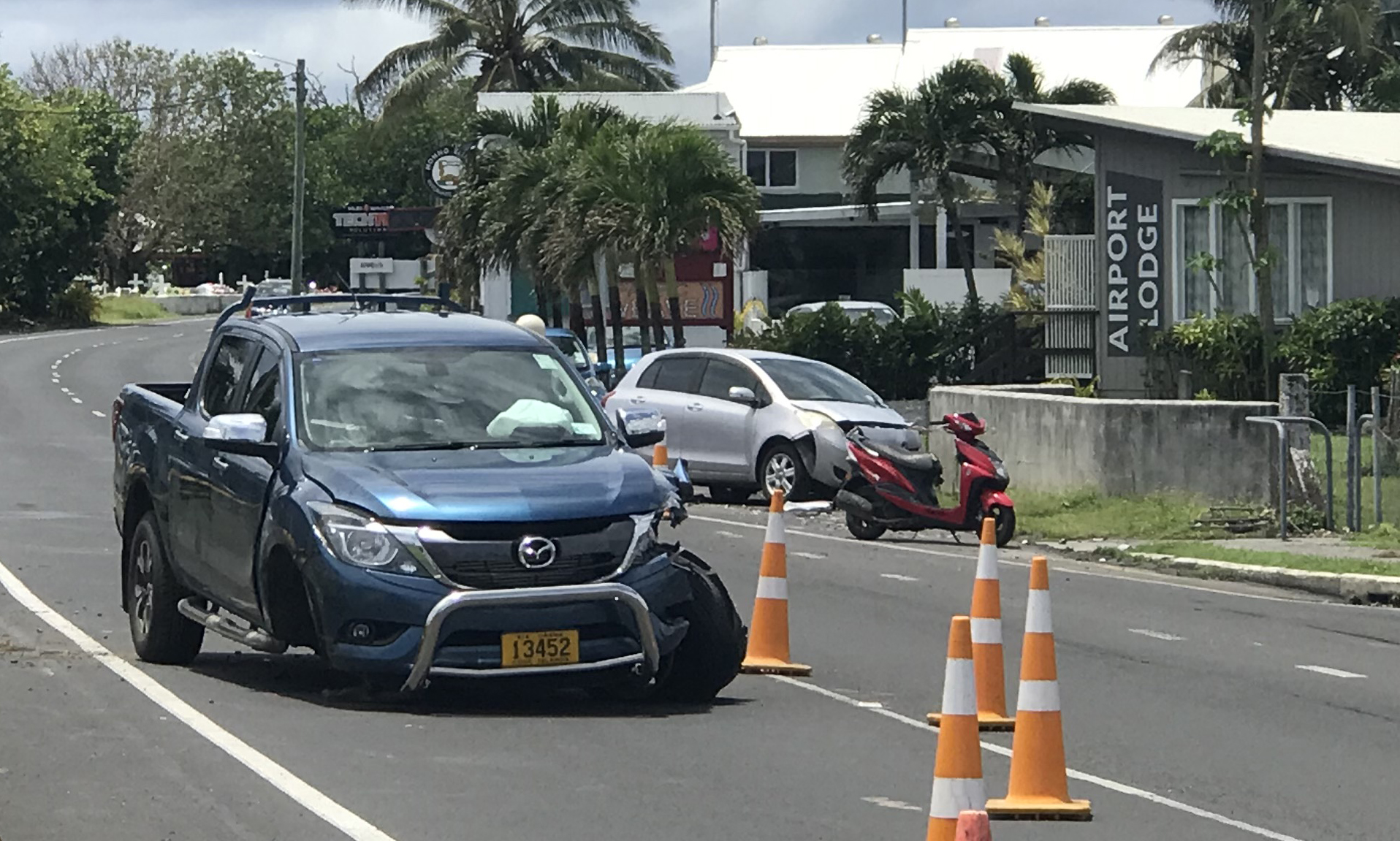JP to deliver reserved decision in reckless and drink-driving case
Tuesday 20 February 2024 | Written by Al Williams | Published in Court, National

Tei John Harawira is facing charges after his pickup collided with a parked car outside The Islander Hotel on February 13, 2022. PHOTO: CI NEWS/22021314
A decision is soon expected on whether a man accused of reckless and drink driving on Rarotonga more than two years ago, is guilty or not.
Tei John Harawira, employed at the New Zealand High Commission on Rarotonga, has been called multiple times to court following an incident on February 13, 2022.
On Monday, Justice of the Peace John Whitta said he would deliver a reserved decision on February 27, following a defended hearing in Avarua.
According to police at around 12.13am on February 13, 2022, Harawira crashed a pickup truck into a parked car on the main road by The Islander Hotel.
Harawira’s blood alcohol limit was allegedly more than four times over the legal limit.
Harawira took the stand on Monday and was questioned by defence lawyer Norman George and then cross examined by police.
George said weather conditions on the evening were rough with heavy rain and the vehicle Harawira crashed into was parked facing the wrong way.
He said it was not a matter of reckless driving while the excess breath alcohol procedures following the incident were not supported by direct evidence of a doctor extracting blood from Harawira.
Harawira, 45, said he had just finished competing in a triathlon when he made his way to Avarua with friends.
He said he had consumed one stubbie bottle of beer then went to a burger bar and ate food on the way to town. The defendant said he ate at about 10.30pm on February 12, 2022.
Harawira and several friends made their way into a nightclub about 11pm.
He said his friends had told him they were going to buy him drinks, but they didn’t, so he went and sat in his vehicle.
Harawira said he headed home in his vehicle about 12am, in the direction of Arorangi.
While police claimed Harawira did not have the lights on, as he drove away, Harawira said he couldn’t recall.
He could not recall police calling out to him, to turn his lights on.
By the time he reached the Islander Hotel, he didn’t see the vehicle in front of him, his headlights were on, he hit the vehicle, then a barrier, “it all happened pretty fast”.
“I didn’t see a car in front of me, my headlights were on, they didn’t catch the car on the side of the road; I didn’t see the car, I hit the car, then hit the barrier across the road, it all happened pretty fast.”
His next recollection was being punched in the head and thrown to the ground and kicked in the head.
“Another guy covered me and told the guy to get lost.”
Harawira said he was already unconscious following the crash.
“The kick got me, I was a bit dazed; the kick landed on my face.”
He recalled police arriving at the scene and asking him to accompany them to the hospital.
Harawira said no blood test was taken at the hospital.
He recalled being arrested and taken to the police station, then taken to prison, he was released on the Monday morning.
Harawira said he paid $770 reparation for the barrier fence and $9600 to the owner of the vehicle.
He made a complaint of assault to police “but nothing came of it”.
In cross examination, police asked him if his headlights were on.
Harawira said they were.
He estimated he was travelling between 40 and 60kmph prior to the crash.
“I didn’t see the car parked on the side of the road.”
Police said the vehicle was parked off the road, inside the white line.
Harawira said his vehicle came to rest about seven to eight metres from the impact of the crash.
“I wasn’t speeding that night.”
He said the airbag worked, he did not receive injuries and said it saved him.
Police then handed him a document, saying, for authorities to carry out a test, would require a specimen.
Harawira read it out to the court: “227 micrograms per 100 millilitres of blood.”
Police said the limit is 50mg: “You are pretty much five times over the limit.”
“Your blood was taken that night.”
“This is not correct,” Harawira said.
In summarising, police said Harawira drove without headlights, police gave chase but lost the vehicle until they were called to the crash. On arrival they established who the driver was and both vehicles were badly damaged.
Police did not dispute the other vehicle was not parked correctly but it was parked off the road. It was not causing obstruction, the court heard.
Harawira would have most likely seen the other vehicle if his lights had been on, the police said.
Driving with no headlights on was reckless and damage to the vehicles was reckless, police added.
“If the road conditions were wet, there would be a basic standard of care on the driver.”
George, in summarising, said the prosecution evidence did not stand up to prove anything beyond reasonable doubt.
There was no evidence about reckless driving. “Where are the experts? George asked.
“To base it entirely on an after accident scenario is dangerous and unreliable.”
George said there was no evidence of how the car was parked.
In terms of the excess breath alcohol, George said the doctor could not recall taking the blood test when called to give evidence.
“This is not a mechanic’s workshop, it is a hospital; if a doctor cannot remember taking blood, that is dangerous.”












































